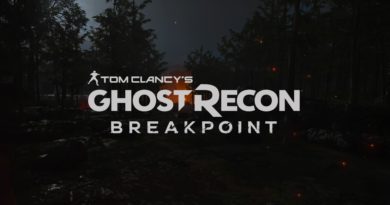Weird West, review
Weird West is truly is a weird one. Ostensibly a Western, yet nary a gee-tar twang or corny rattle of spurs. Instead, a strange, electronic ambience, a strong leaning towards the supernatural, and a distinct lack of darn-tootin’ voiced characters. Weird West immediately puts you on the back foot, subverting expectations. For instance, I initially shot at a circling flock of vultures early in the game, collecting their questionable meat to cook at a fire for a health boost. Only to realise that each bullet is precious in this world, and I had wasted all of mine.
This is a studious, methodical title, more Desperados than Fallout or X-Com, an action title that promptly punishes unthoughtful aggression. To the point where I’m still not certain that a turn-based approach might not have been more suited. The Desperados reference holds up, presented as it is in a similar vein to that series’ most recent offering, and with a concordantly tight tolerance for ways through each vignette level. Ranging from a random ambush or encounter on the road to the small ranches and towns you can wander through. Where talking to denizens and trading, mayhap to hire a spare gun to join your posse.
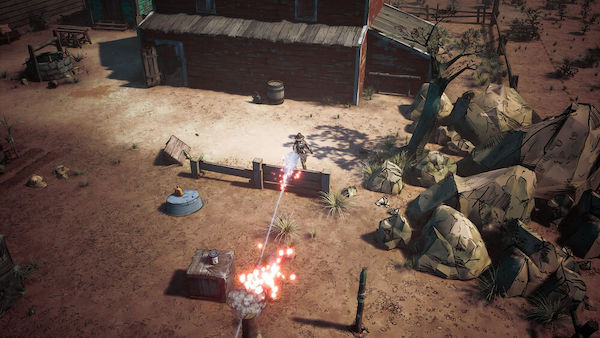
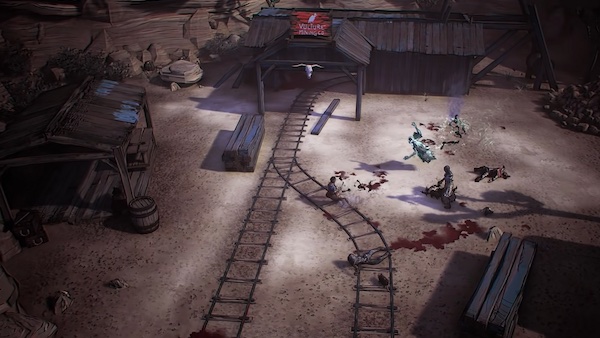
Weird West is a game where you slowly work through small spaces, searching and scrounging for scraps, weapons and ammo. Before working out how to deal with groups of varmints sporting red vision cones and a propensity for filling you with holes. You’ll hunt bounties (which are almost always difficult), talk to key characters in an attempt to circumvent violence as an option (this is usually possible though not always clearly so) and generally wonder why the heck you never have enough coin to buy a goddamn horse.
Plenty of risk, very little reward
The (literal) saving grace against Weird West’s unforgiving awkwardness is the quick save, which allows you to experiment with approaches and explore areas in order to build up a mental map of where you need to go. It’s never advisable to get into a scrap against more than a few aggressors, because enemy AI is super accurate and quick and almost always blows you away. They also increase in number and toughness as the main missions progress. The action, twin-stick shooting feels constantly underpowered and almost unresponsive. I never felt like my shotgun blasts were effective unless meticulously planned and executed.
In every instance of a messy, open conflict, I found that I would quickly die and need to rethink how to proceed. Of course, you gain better weapons over time, as well as armour and potions – so it feels like the game wants you to gain some confidence in this area. However, I found the push was hard towards stealth, even when this slows the experience right down. Making the falling apart of plans all the more frustrating.
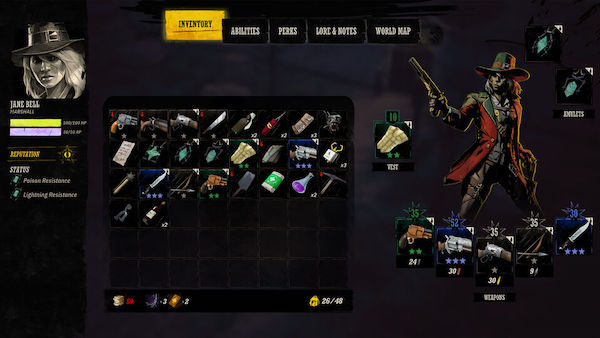
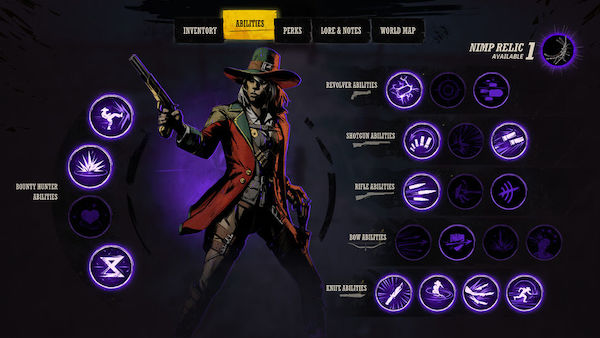
A problem with the stealth is that there are no distinct options to dictate the environment, such as to attract or distract guards. Some missions are also structured so that you must make noise to progress. Even if you manage to weasel your way to the next area, your collection of aggressors magically spawn in the new area, kicking your arse. It reveals a strange disconnect with a design philosophy that encourages exploration and experimentation yet fails to reward it.
Weird, Weird West
A few times, with strong posse in tow, I simply made myself known and let the chaos play out to see if we would emerge victorious. This becomes harder to do as you progress, though. Further increasing the feeling of a title that doesn’t accommodate open play as much as it purports to. That said, there is usually an explosive or corrosive barrel to shoot or kick to provide an ambush start. Of course you can build your AI companions up by giving them better gear. However, after the opening hours with Weird West, I started to feel like only someone who really clicks with this kind of game is going to get the most out of it.
The dynamic nature of Weird West slowly becomes apparent as you play. With people you saved earlier turning up to help you fight just as you’re nearing death. Or locations becoming home to other factions if you leave them bereft of living souls. I feel like this reactionary nature is not as clear as the game’s review guide suggests.
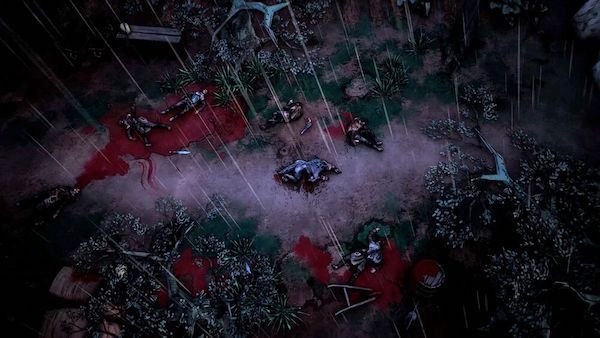
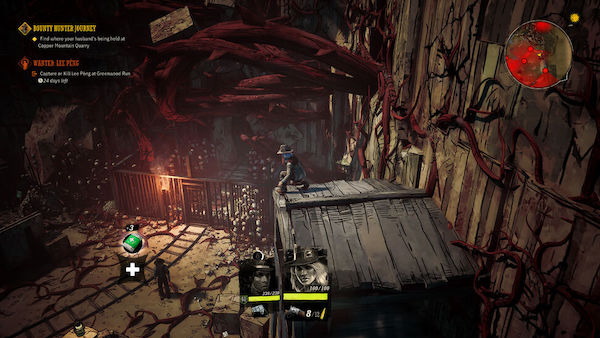
Despite my growing feeling that Weird West is not my kind of game. I still find myself oddly entranced by it, hooked to keep playing. The way that you move back and forth between locations, in-game days ticking away, affecting optional mission deadlines. It feels compelling in that there are always a couple of things you could be doing. Whether it’s scrounging enough scratch to pay the next critical mission’s gatekeeper or working around a problem in a non-lethal manner.
A slow burn that takes hold?
Broken into separate character ‘journeys’, Weird West focuses on a handful of core themes, one per protagonist. The Bounty Hunter’s quest for her missing husband hangs a shade across the dirty window of this world. While the quests of the remaining characters unravel the factions and history present in this fairly unique title.
Therefore, while I initially didn’t gel with Weird West’s unforgiving nature and general opaqueness, there is depth to be found. It calls for a meticulous and patient player, one who can adapt on the fly when all turns to crap. An unlikely comparison that comes to me is Hitman, where layers of experimentation eat away at the eventual solution. Weird West is nowhere near as complex, but I think the analogy fits, to inform you whether this is going to be the right fit or if you should instead leave it for the vultures.



